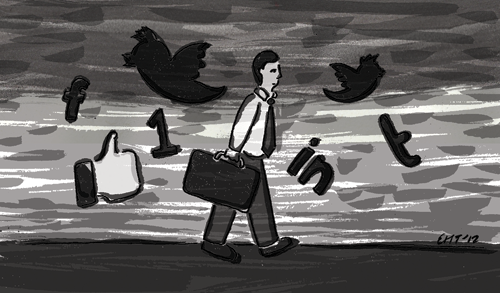Last month, the national unemployment rate dropped to 8.5 percent. While still high, 8.5 is the lowest unemployment rate in more than two years. This sudden drop could mean that a turnaround in unemployment could be on the horizon.
Get plugged in

Last month, the national unemployment rate dropped to 8.5 percent. While still high, 8.5 is the lowest unemployment rate in more than two years. This sudden drop could mean that a turnaround in unemployment could be on the horizon.
In contrast, a recent surge in social media may be the reason unemployment is dropping. Many websites, including LinkedIn, Twitter and Facebook, have provided job seekers with virtual résumés, networking tips, support and information on prospective employers.
LinkedIn provides an online outlet for many things; social networking, news, web applications and job listings. That last one is particularly important, considering our current economic climate.
Using LinkedIn, users can research companies with which they are interested in working. LinkedIn’s search engine provides company statistics to potential employees. Statistics include female to male ratios, the percentage of positions most common within the company, the location(s) of the company’s headquarters and, in some cases, a list of past and present employees.
Last summer, LinkedIn launched a new feature which gives companies an “Apply with LinkedIn” button. This allows users to apply to said companies through the website, using their online profiles as resumés. Cool, right?
Online social media is capable of some pretty amazing things. Families and friends can use Skype to have face-to-face conversations via streaming video from anywhere in the world. Photos, music and videos can be shared almost instantly through Facebook, Twitter, YouTube and Tumblr.
Just like distant family and friends, employers can now conduct long-distance interviews and meetings with clients and potential employees via Skype and other media platforms. As handy as this is, nothing compares to good ol’ fashioned human conversation and professionalism. Heck, we can even use Skype to communicate on our iPhones now!
Some would argue that social media is slowly (or quickly) taking over our lives. Facebook and its fellow social sites are leading causes of procrastination, both on and off the college campus. On an average day, Twitter traffic consists of more than 150 million tweets.
As convenient as the Internet has made communicating, one should remember that living vicariously through social media can be detrimental to one’s social and mental well-being.
In defense of social media, websites like LinkedIn are doing positive work in providing job seekers with a platform on which they can put their best face forward. But at the same time this massive rise in different social media platforms is disconcerting. Sure, it is great that people searching for jobs can use the Internet to make themselves look good, but the Internet takes away much of what real-life networking provides.
As convenient as all of this technology is (it really makes life so much easier), it takes the hard work and perseverance that comes from looking for a job and making contacts without the additional help.
Not to say that you should not make use the myriad of social media out there. By all means, use it to its fullest extent! Bulk up your online portfolio and contact lists, and network yourself to death if that is what you have to do. Just include some real-life communication in there as well.
If you’re really interested in working for a certain company (and it is within your means to visit the physical location), drop in and express your interest, or make an appointment, depending on how formal the company is. This will show the people in charge that you are sincere in your employment endeavors.
Another thing to consider: remember back in 2005 when MySpace was the coolest thing ever? One of the biggest arguments against MySpace was that people could pretend to be whoever they wanted to be online, and that could have some pretty negative consequences.
The Internet can be a pretty scary place—child predators and adults soliciting sex to minors online come to mind. But it’s also filled with scammers and phishing. Use caution while prowling the various social media sites out there.
Some career advising websites recommend having an active profile on all of the major social networking sites out there. That would include Facebook, Twitter, YouTube (if you’re into the whole v-log thing), WordPress (or one of the many other free blogging websites out there; this is to show your portfolio off, whether it be for writing, art or something else), LinkedIn and whatever else you find to be beneficial to job searching and networking.
This does work for some people, and I applaud those who make use of social media. Just remember to keep it in perspective with real life. We should not live with our faces glued to the computer all day. Get out there and network!
Networking isn’t just confined to employment. Meeting people who have similar interests to yours can be a form of networking. Attend concerts, poetry slams, sporting events or whatever you are interested in.
Doing what you love will make you happy, and being happy will generally bring about more positive results in every avenue of your life. So plug into social media; use Facebook, use LinkedIn, but don’t forget to work hard, show genuine interest in what you do, and like, go outside and stuff!



